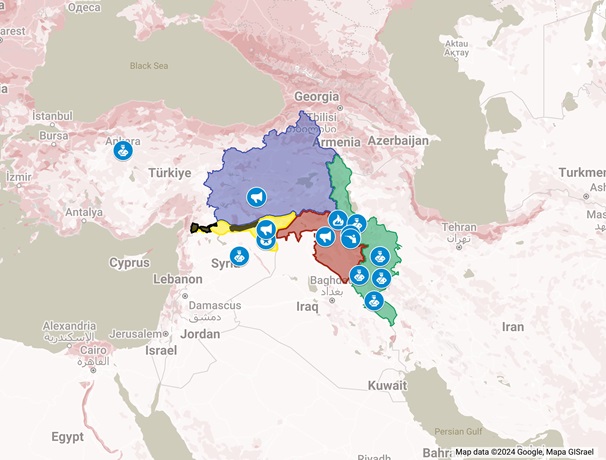1.2K
Iran
- On April 13, Iranian border guards killed one Kurdish border porter (kolbar) near Sardasht and another near Saqqez. The slain kolbars, Omid Saidi and Mehrdad Abdullah Zadeh, were shot while transporting cargo near the Iran-Iraq border. Concomitantly, Iranian authorities arrested several Kurds, including a Kurdish teacher, for organizing a Newroz celebration in Ilam. The regime also detained an activist in Kermanshah, a civilian in Mehabad, and the father of a deceased protester and a journalist in Senna. Additionally, the Hengaw Organization for Human Rights reported the regime arrested a prominent academic named Loqman Qanbari for translating a book on Kurds in the Middle East written by the famous Jewish-Arab writer Orfa Bengio.
- Several Iranian drones and missiles targeting Israel were observed flying over Iraqi Kurdistan on Saturday. Iraq’s airspace was closed during Saturday’s attacks, and at least one missile crashed in Erbil Governorate’s Soran District. Simultaneously, the Islamic Revolutionary Guard Corps (IRGC) vowed Iran would retaliate against any regional state helping Israel. Iranian opposition groups fear the Iranian regime will employ its modus operandi of using tensions with Israel as a pretext to attack exiled opposition parties and anti-regime dissidents.
Iraq
- Iraqi Prime Minister Mohammed Shia al Sudani arrived in Washington on Sunday. On Monday, al Sudani and an Iraqi delegation that included Kurdistan Regional Government (KRG) Department of Foreign Relations head Safeen Dizayee met with U.S. President Joe Biden at the White House. Despite Iranian-backed efforts to expel U.S. forces from Iraq, Sudani reassured U.S. officials his cabinet remains committed to the U.S.-Iraq Higher Military Commission. Following Monday’s meeting, President Biden expressed his view on ongoing U.S.-Iraq ties by saying, “Our partnership is pivotal for our nations, for the Middle East, and, I believe, for the world.” Safeen Diyazee told Rudaw that President Biden called for Baghdad and Erbil to resolve their issues and stressed the importance of Iraq and Iraqi Kurdistan to U.S. interests. Moreover, U.S. Secretary of State Tony Blinken had breakfast with the Iraqi delegation and discussed the U.S.-Iraq Higher Coordinating Committee and Iran’s recent attacks on Israel. The U.S. The Department of State released a Higher Coordinating Committee fact sheet after the meeting that revealed the U.S. has provided at least 3.5 billion dollars in aid to Iraq since 2014. Moreover, a joint statement was released by Defense Secretary Lloyd Austin and Prime Minister al Sudani following their meeting, discussing “efforts to modernize the ISF [Iraqi Security Forces], including Kurdish Peshmerga forces, and build their capabilities.” The statement also highlighted securing “sites” in Iraq and Kurdistan from aerial threats. President of Kurdistan Region Nichervan Barzani expressed full support for al Sudani’s visit to Washington. That said, Baghdad has yet to finalize the implementation of Iraq’s budget law, which includes funds for the salaries of public employees in Iraqi Kurdistan. Concurrently, Iraqi Kurdistan’s oil exports remain halted despite the KRG and Association of the Petroleum Industry of Kurdistan’s (APIKUR) increased efforts to restart them. APIKUR spokesperson Myles Caggins revealed Iraq has now lost more than 14 billion dollars since the exports were halted in March 2023.
Syria
- The High Electoral Commission of the Autonomous Administration of North and East Syria (AANES) invited international and local organizations to observe the upcoming local election set for May 31. This election is the second since the region was liberated from the Assad regime in 2011, following the first, which took place in three phases in 2017 and 2018.
- According to a report by North Press, Iranian-backed militias are recruiting fighters in Homs and Hama and preparing them to fight the Kurdish-led Syrian Democratic Forces (SDF) in Deir Ez Zor, similar to last year’s support for tribes fighting the SDF. The region remains unstable due to increasing attacks by ISIS (Da’esh) and the presence of Iranian-backed militias. The Public Security Service (Asayesh) announced the arrest of a terrorist in charge of a “guest house” in al-Shaddadi. Da’esh terrorists and Iranian-backed militias attacked the SDF in several areas in the past week. Separately, internal clashes between Turkish-backed factions in the occupied Afrin region resulted in the death of two militants amid ongoing human rights violations against the population by these groups.
Turkey
- Following the local elections, the parliamentary group of the pro-Kurdish People’s Equality and Democracy Party (DEM) called for an investigation into alleged “irregularities,” which they claim prevented a “fair and democratic election” from taking place. Despite winning the majority of the Kurdish region, the DEM Party’s request for investigations came after several Kurdish cities experienced sudden changes in the closing of ballots. Additionally, the DEM Party accused the ruling Justice and Development Party (AKP) of preventing fair and equal competition by mobilizing “all public institutions and resources” for its own benefit. On a different occasion, the DEM Party called for the release of 108 Kurdish politicians accused of various charges in the case known as the “Kobani Case.” On April 17, the Ankara Court will issue a verdict.

